Generation_gap_中英对照
全新大学英语综合教程第二册课文TheGenerationGap
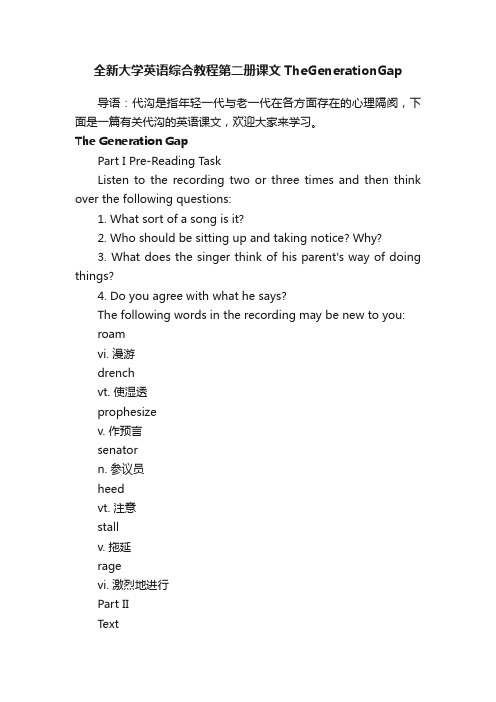
全新大学英语综合教程第二册课文TheGenerationGap导语:代沟是指年轻一代与老一代在各方面存在的心理隔阂,下面是一篇有关代沟的英语课文,欢迎大家来学习。
The Generation GapPart I Pre-Reading TaskListen to the recording two or three times and then think over the following questions:1. What sort of a song is it?2. Who should be sitting up and taking notice? Why?3. What does the singer think of his parent's way of doing things?4. Do you agree with what he says?The following words in the recording may be new to you:roamvi. 漫游drenchvt. 使湿透prophesizev. 作预言senatorn. 参议员heedvt. 注意stallv. 拖延ragevi. 激烈地进行Part IITextThis comedy centers around a proud father's attempts to help his children, attempts which somehow or other always end up embarrassing them. For the sake of fun it carries things to extremes, but nearly everyone can recognize something of themselves and their parents in it.FATHER KNOWS BETTERMarsh CassadyCHARACTERS: FATHER; MOTHER; HEIDI, 14; DIANE, 17; SEAN, 16; RESTAURANT MANAGER, 20s; MRS. HIGGINS.SETTING: Various locations including a fast-food restaurant, the Thompson family dining room, and an office at a high school.ATRISE: As the lights come up, HEIDI enters and crosses Down Right to the edge of the stage. SEAN and DIANE enter and cross Down Left to the edge of the stage. They listen as HEIDI addresses the audience.HEIDI: My dad's a nice man. Nobody could possibly believe that he isn't. Yet he's... well, he's always doing these stupid things that end up really embarrassing one or more of us kids. One time, see, my brother wanted to buy this guitar. Been saving money for it for a long time. Then he got a job at this fast-food place, OK? Waiting tables. It was Sean's first actual job, and he was real happy about it. He figured in two or three months he'd have enough money to buy exactly the kind of guitar he wanted. Mom and Dad were proud of him, and well, OK, he's my big brother, and he's always pulling these dumb things on me. But, well, I was proud of him too. You know what happened? I hate to tell you because:SEAN, DIANE and HEIDI: (In unison) Father knows better!(The lights come Up Left on the fast-food restaurant where SEAN works. It consists of a counter and a couple of small tables.The MAN-AGER stands behind the counter. SEAN is busily cleaning the tables when FATHER walks in.)MANAGER: Good evening, sir. May I help you?FATHER: Good evening.SEAN: (To himself) Oh, no!(He squats behind one of the tables trying to hide from FATHER.)FATHER: I'm looking for the manager.MANAGER: That would be me, sir.FATHER: I'm Sam Thompson. My son works here.MANAGER: Oh, you're Sean's father.FATHER: Yes. It's his first job, you know. I just wanted to check that he's doing OK.MANAGER: Oh, fine. No problem.SEAN: (Spreading his hands, palms up, speaking to himself) What did I do to deserve this? Tell me what?FATHER: Hiring him was a good thing then?MANAGER: Well, yeah, I suppose so.SEAN: (Still to himself.) Go home, Dad. Go home. Go home.FATHER: I'm sure he's a good worker but a typical teenager, if you know what I mean.MANAGER: (Losing interest) I wouldn't know.FATHER: He's a good boy. And I assure you that if there are any subjects that need to be addressed, Sean and I will have a man-to-man talk.MANAGER: I don't think that will be necessary...FATHER: Oh, no problem. I'm proud of my son. Very, very proud. And I just wanted you to know that I'll do anything I can to help him through life's dangerous sea.SEAN: (Standing up and screaming) Aaaargh! Aaaargh!Aaaaaaargh!FATHER: Son, I didn't know you were here.SEAN: It's where I work, Dad.FATHER: Of course. I mean, I didn't see you.SEAN: I can't imagine why.FATHER: Your manager and I were just having a nice chat.(DIANE enters Down Left just as HEIDI enters Down Right. They look at SEAN and FATHER.)SEAN, DIANE, HEIDI: (In unison) Father, you know better than that.(The lights quickly fade to black and then come up a second or two later. SEAN stands alone at the Down Right edge of the stage. HEIDI and DIANE cross to Down Left edge of the stage.) SEAN: If that sort of thing happened only once in a while, it wouldn't be so bad. Overall, I wouldn't want to trade my dad for anyone else's. He loves us kids and Mom too. But I think that's sometimes the problem. He wants to do things for us, things he thinks are good. But he needs to give them more thought because:SEAN, HEIDI and DIANE: (In unison) Father knows better!(The lights fade to black and come up on the Center Stage area where FATHER and the three children are seated around the dining room table. MOTHER enters carrying a dish, which she sets on the table. FATHER quickly rises and pulls out her chair. She sits. The family starts eating dinner.)FATHER: I have a surprise for you, Diane.DIANE: (Knows it can't be good.) You have... a surprise?MOTHER: Well, whatever it is, dear, don't keep us in suspense.FATHER: Well, you know, Dan Lucas and I work together?DIANE: Kyle's father?MOTHER: Don't interrupt, dear, your father is trying to tell you something.HEIDI: (Stage whisper to SEAN) Something Diane won't want to know, I'll bet.SEAN: (Whispering to HEIDI) Whatever would make you think that?MOTHER: Sean, dear. Heidi, sweetheart, don't distract your father.SEAN and HEIDI: (Simultaneously) Sorry, Mom.FATHER: Now then. As I was saying, I know how much you like young Kyle.DIANE: Father!FATHER: It's true, isn't it? Didn't I hear you tell your mother that you wish Kyle would ask you to the senior prom?SEAN: Uh-oh!HEIDI: Oops!MOTHER: Please, children, please. Your father is trying to speak.DIANE: (Through clenched teeth, the words are in a monotone and evenly spaced.) Yes-I-said-that-why-are-you-asking?FATHER: Well then.DIANE: (Becoming hysterical) "Well then" what?!FATHER: What did I say? Did I say something wrong?HEIDI: (To SEAN) Not yet, he didn't.SEAN: (To HEIDI) But you know it's coming.MOTHER: Children, please. Do give your father the respect he deserves.HEIDI and SEAN: (Rolling their eyes) Yes, Mother.FATHER: Well, today I saw Dan and asked if he'd like to go tolunch at that French restaurant on Third Street. You know the one, Mother.MOTHER: Well, yes, I believe I do.FATHER: My treat, I told him. And, of course, he was glad to accept.MOTHER: Why wouldn't he be?FATHER: (Somewhat surprised) Well, yes.DIANE: What-has-this-to-do-with me?!MOTHER: Diane, sometimes I just don't understand your behavior. I try my best.DIANE: (Very short with her) I'm sorry.MOTHER: Thank you, Diane. (To FATHER) Please do go on, dear.FATHER: As I said —HEIDI: We know what you said, Daddy.FATHER: Er... uh, what's that?SEAN: She said, "We know what you said, Daddy."FATHER: Yes, yes, of course.MOTHER: Do get on with it, dear. I've made the most glorious dessert. An old recipe handed down to me by my great Aunt Hilda —DIANE: Mother, please!MOTHER: Yes, dear?(DIANE shakes her head and lets her body fall against the back of the chair.)FATHER: At any rate, Dan's a nice guy. Never knew him well. Found we have a lot of the same interests. Our families, our community, global peace, human welfare.HEIDI: (Mumbling to herself) That narrows it down, all right.SEAN: Father?FATHER: Yes, son?SEAN: I do believe Diane would like to know the surprise.DIANE: (Breathing hard as if exhausted, she turns to SEAN, nodding her head up and down repeatedly.) Thank you, Sean. I owe you one.FATHER: Well, yes. Here it is then. I told Dan of your interest in his son.DIANE: You what?MOTHER: Diane, what has come over you? I just don't understand the younger generation. Why back in my day —DIANE: Mother, please!MOTHER: What, what? What?HEIDI: Mother, I believe she wants Father to continue.SEAN: (To himself) Get this over with, more likely.DIANE: Daddy, please, tell me. Now. Right away. What did you say, Daddy? Please. Tell me, what did you tell Mr. Lucas? Tell me, please. Please, tell me.FATHER: Well, now, isn't this nice. It looks like my little scheme is a success. You're so eager to find out... makes a man feel as if it's all worthwhile.HEIDI: (To SEAN) Can you believe this?SEAN: (To HEIDI) Oh, sure. Can't you?FATHER: Yes, well, I told him how much you liked young Kyle, and how you'd been wishing he'd ask you to the prom.DIANE: You didn't! Tell me you didn't!FATHER: Oh, yes. Anything for my children.DIANE: (Swallowing hard) And... and —MOTHER: Diane, are you all right?DIANE: (She juts out her chin at MOTHER and quickly jerks her head around to face FATHER.) Well... what did he say?!FATHER: Well, of course, being the sort of man he is — frank, understanding, he said he'd speak to the young man, insist he give you a call.DIANE: (Angry scream!) Whaaaaaat!SEAN and HEIDI: (Together) Father, you know better than that.FATHER: I do? Yes, yes, I guess I do. I've... done it again, haven't I?(The lights quickly fade to black and then come up a second or two later. DIANE stands alone at the Down Right edge of the stage. HEIDI and SEAN enter Down Left and cross to the edge of the stage.)DIANE: Can you imagine how humiliated I was? An honor student, class president. And Father was out asking people to have their sons call and ask me to the prom! But that's dear old dad. Actually, he is a dear. He just doesn't stop to think. And it's not just one of us who've felt the heavy hand of interference. Oh, no, all three of us live in constant dread knowing that at any time disaster can strike because:DIANE, HEIDI and SEAN: (Shouting in unison) Father knows better.(The lights fade to black and quickly come up again Stage Left where there is an executive-type desk and chair and two other chairs. Behind the desk sits MRS. HIGGINS, in charge of admitting new students to Benjamin Harrison High School. HEIDI and FATHER sit in the other chairs.)MRS. HIGGINS: So this is our new student, is it?FATHER: That's right.MRS. HIGGINS: What's your name, young lady?HEIDI: HEIDI Thompson.MRS. HIGGINS: I'm sure you'll find the students friendly. Andthe teachers more than willing to answer questions.FATHER: She is an exceptional young woman, you know.HEIDI: Daddy!FATHER: Very, very bright.MRS. HIGGINS: Yes, now if we can get you to fill out —FATHER: Don't know where she got her brains. Her mother, I suppose. Oh, I was bright enough. But nothing like HEIDI. All her teachers have told Mrs. Thompson — that's her mother — and me that she was just about the brightest —MRS. HIGGINS: (Interrupts as she loses her patience, though trying to be pleasant) As I said, if you have proof of vaccinations —FATHER: (Interrupts, carrying on with his line of thought) Besides being bright, she's very, very talented.HEIDI: (Twists her hands over and over in front of her chest.) Please, Daddy, don't do this.FATHER: Well, of course I will, darling. I'm proud of you. Your mother and I are proud of you. (Turns back to MRS.HIGGINS.) Why just last year, in her last year of junior high school, before we moved, Heidi placed first in the county in the annual spelling bee! Isn't that wonderful? And she plays the piano like an angel. An absolute angel.HEIDI: Daddy, please. Please, please. Daddy, I have to go to class. I want to go to class. Please let me go to class.FATHER: See what I mean? Such an eager learner. I can't imagine anyone's being more eager for knowledge than my Heidi. My little girl.MRS. HIGGINS: Yes, well, be that as it may —HEIDI: Aaargh! Aaaaargh! Aaaargh!(DIANE and SEAN enter Down Right. They look at HEIDI,FATHER, and MRS. HIGGINS.)HEIDI, DIANE and SEAN: (Shouting in unison) Daddy, you know better than that!FATHER: Er, uh, I do?(Curtain)New Words and Expressionslocationn. a place or position 场所;位置fast-fooda. 供应快餐的dining room餐厅dine▲vi. (fml) eat dinner 进餐embarrassvt. make (sb.) feel awkward or ashamed 使窘迫;使不好意思guitarn. 吉他dumba. foolish; unable to speak 愚蠢的;哑的unisonn. 一致;齐唱;齐奏in unisonacting in the same way at the same time 一致地;一起consistvi. 组成,构成consist ofbe made up of 由…组成squatvi. 蹲n. 手掌yeahad. (infml) yesfadevi. lose color or brightness; disappear slowly 褪色;变黯淡;消失awhilead. for a short time 片刻overallad. in general 大体上a. including everything; total 包括一切的;总计的trade (sth.) for (sth. else) 用(一物)交换(另一物)suspensen. 悬念keep (sb.) in suspensedelay telling (sb.) what they are eager to know 使产生悬念,故意迟迟不告诉interruptvt. stop (sb.) from continuing what they are saying or doing 打断…的`讲话,中断…的行动betvt. be sure 敢说,确信distract▲vt. take (sb.'s attention) away from sth. esp. for a short time 转移(注意力);使分心simultaneouslyad. at exactly the same time 同时地simultaneous▲ a.promn. (AmE)(高中、或大学等的)班级舞会int. (infml) 哎哟clenchvt. hold (one's teeth, hands, etc.) together tightly 咬紧;握紧monotonen. (语调、色彩等的)单调hysterical▲a. 歇斯底里的erint.(用于表示迟疑、沉吟)哦,呃uhint. 嗯,唔gloriousa. wonderful; splendid; having or deserving great fame and honor 极好的;辉煌的;光荣的dessertn. (餐后)甜点心recipe▲n. 烹饪法;秘诀hand downgive or leave to people who are younger or come later 把…传下去at any ratewhatever may happen, in any case 无论如何,不管怎样communityn. the people living in one place, district, or country, considered as a whole 社区;社会welfaren. 福利;幸福narrow downmake (a list of things) smaller 减少,缩小mumblev. say sth. in a way that others can not really hear the words 咕哝;含糊地说exhaustvt. tire out; use up completely 使筋疲力尽;用完,耗尽repeatedlyad. again and again 反复地come over(of a feeling) affect (指某种感觉)刺激或影响swallowv. 吞,咽jutv. (使)突出,伸出jut out(使)突出,伸出jerk▲vt. pull suddenly and quickly 猛地一扭(或一拉等)franka. showing one's thoughts and feelings openly 坦白的,直率的know better than (that/to do sth)be wise or well-trained enough not to do (sth.) 明事理而不至于(做某事)humiliatevt. make (sb.) feel ashamed or seem silly, esp. in public 羞辱,使丢脸interferencen. 干涉;干扰constanta. without stopping; unchanging 持续的;不变的dread▲n. great fear 畏惧,恐怖in charge (of)having control (over) or responsibility (for) 主管,负责exceptional▲a. unusual 杰出的,特别的fill outcomplete 填写patiencen. 耐心,忍耐proofn. 证据,证明vaccinationn. 疫苗接种talenteda. gifted 有才能的;天才的talentn. 才能,天才darlingn. (用作称呼)亲爱的;心爱的人juniora. younger, lower in rank than another 较年幼的;地位较低的angel▲n. 天使Proper NamesMarsh Cassady马什·卡萨迪Heidi海蒂(女子名,Adalheid的昵称)Diane黛安(女子名,Diana的异体)Sean肖恩(男子名)Higgins希金斯(姓氏)Thompson汤普森(姓氏)Dan Lucas丹·卢卡斯(Luke的异体)Kyle凯尔(男子名)Hilda希尔达(女子名)Benjamin Harrison本杰明·哈里森高级中学Language Sense Enhancement1. Read aloud the comments on Father made by Sean (lines 60-64) and Diane (lines 163-168) and learn them by heart.2. Read aloud the following poem:PerspectivesDavid AnthonyI, when young,meant to change the world.Now I seethat the world has changedfrom my point or view.3. Read the following quotations. Learn them by heart if you can. You might need to look up new words in a dictionary.Each generation imagines itself to be more intelligent thanthe one that went before it, and wiser than the one that comes after it.—— George OrwellIf youth is the season of hope, it is often so only in the sense that our elders are hopeful about us.—— George EliotIt is one of the capital tragedies of youth — and youth is the time of tragedy — that the young are thrown mainly with adults they do not quite respect.—— H, L, MenckenYouth is a blunder; manhood a struggle; old age a regret.—— Benjamin Disraeli4. Read the following humorous story for fun. You might need to look up new words in a dictionary.During one "generation gap" quarrel with his parents young Michael cried, "I want excitement, adventure, money, and beautiful women. I'll never find it here at home, so I'm leaving. Don't try and stop me!"With that he headed toward the door. His father rose and followed close behind."Didn't you hear what I said? I don't want you to try and stop me.""Who's trying to stop you?" replied his father. "If you wait a minute, I'll go with you."【全新大学英语综合教程第二册课文The Generation Gap】。
Generation_Gap
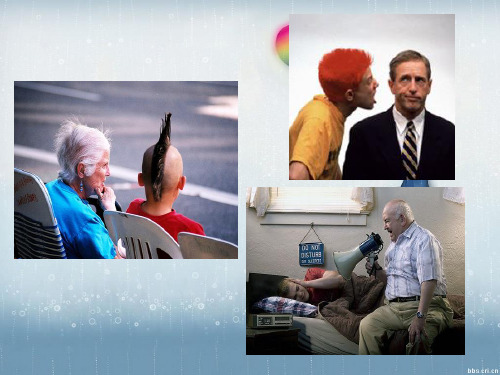
41.可以拼出每个字,但不见得能写出来。 42.少打电话,经常发短信。 43.键盘都磨损得很快,无论手机还是电脑。 44.彩铃两周一换。 45.拥有一个以上的MP3.
46.发花痴。 47.不看500字以上的帖子。 48.永远对自己的发型不满意。 49.爱去小店淘宝。 51.对80后不屑。
51.喜欢QQ不喜MSN。 52.恐龙战队奥特曼必看过。 53.两分钟经常这样安排:前一分钟是崇拜,
Mother’s Day
Time : second Sunday in May Flower : Carnation (康乃馨)
Day lily (萱草)
God could not be everywhere and therefore he made mothers.
—Jewish proverb
Solutions
• Stand in the other’s shoes • Give each other chances of
understanding and making mistakes • Be forgiving and considerate • Talk freely and equally
Time:the third Sunday in June Flowers : white rose
sunflower
Fathers’ Day
Speaking
A: Look! What my mother gave me for my birthday—a letter!
B: b. A lette1r for a birthday present ? C: What does it say? A: Oh! I’ve told my mother that my boyfriend does not
generation gap
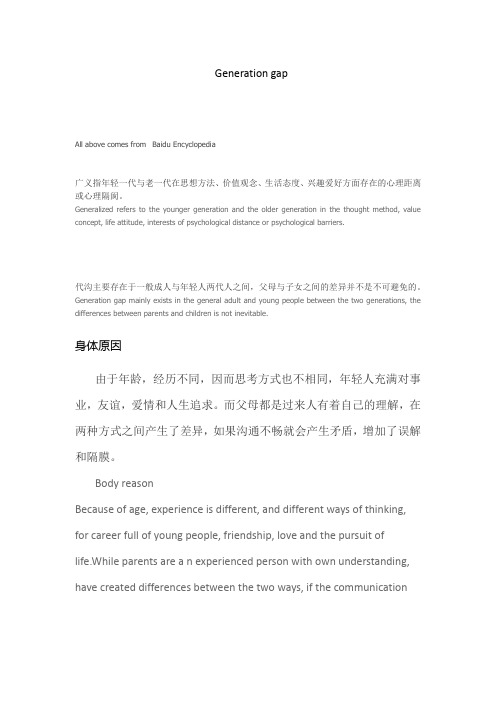
Generation gapAll above comes from Baidu Encyclopedia广义指年轻一代与老一代在思想方法、价值观念、生活态度、兴趣爱好方面存在的心理距离或心理隔阂。
Generalized refers to the younger generation and the older generation in the thought method, value concept, life attitude, interests of psychological distance or psychological barriers.代沟主要存在于一般成人与年轻人两代人之间,父母与子女之间的差异并不是不可避免的。
Generation gap mainly exists in the general adult and young people between the two generations, the differences between parents and children is not inevitable.身体原因由于年龄,经历不同,因而思考方式也不相同,年轻人充满对事业,友谊,爱情和人生追求。
而父母都是过来人有着自己的理解,在两种方式之间产生了差异,如果沟通不畅就会产生矛盾,增加了误解和隔膜。
Body reasonBecause of age, experience is different, and different ways of thinking, for career full of young people, friendship, love and the pursuit oflife.While parents are a n experienced person with own understanding, have created differences between the two ways, if the communicationcan produce contradiction, increase the misunderstanding and diaphragm.社会发展每一个阶段社会都在发展,环境都在变化,而在中国过去几十年,由于电子产品的应用,而年长者疏于学习,获得的知识造成了不平衡,如果统称为代沟,虽然武断,但是年龄差别造成的平均差异,还是非常明显。
generation gap 英语解释

generation gap 英语解释Generation gap refers to the differences in opinions, attitudes, and behaviors between individuals of different generations. This gap is often attributed to the different experiences, values, and worldviews that people from different generations have, which can lead to misunderstandings and conflicts.The generation gap is a common phenomenon that has been observed throughout history. As each new generation comes of age, they bring their own set of beliefs, ideas, and perspectives that may differ from those of their predecessors. This can create tension and discord within families, workplaces, and society as a whole.One of the main causes of the generation gap is the rapid pace of technological change. Younger generations, who have grown up with smartphones, social media, and the internet, are often more tech-savvy and digitally connected than their older counterparts. This can lead to differences in communication styles, preferences, and behaviors, which can be a source of conflict between generations.Another factor contributing to the generation gap is the shifting social and cultural norms. Values and attitudes towards issues such as gender equality, diversity, and environmental sustainability can vary greatly between generations, leading to disagreements and clashes of opinion. For example, older generations may have more traditional views on marriage and family, while younger generations may be more open to alternative lifestyles and relationships.The generation gap can also be exacerbated by differences in life experiences and economic opportunities. Older generations may have grown up in a time of economic prosperity and stability, while younger generations may be facing challenges such as student debt, job insecurity, and high housing costs. These disparities can create resentment and tension between generations, as each group may feel that the other does not understand or empathize with their struggles.Despite the challenges posed by the generation gap, there are ways to bridge the divide and foster understanding and cooperation between generations. One key strategy is to engage in open and respectful communication. By listening to each other's perspectives, sharing experiences, and finding commonground, people from different generations can learn to appreciate and respect each other's differences.Another important approach is to promote intergenerational collaboration and mentorship. By fostering relationships between individuals of different generations, opportunities for learning, growth, and mutual support can be created. Younger generations can benefit from the wisdom and experience of their elders, while older generations can gain fresh insights and perspectives from the younger generation.In conclusion, the generation gap is a natural and inevitable part of human society. While it can create challenges and conflicts, it also presents opportunities for growth, learning, and collaboration. By recognizing the differences between generations and working towards mutual understanding and respect, we can bridge the generation gap and build a more harmonious and inclusive society.。
Generation gap
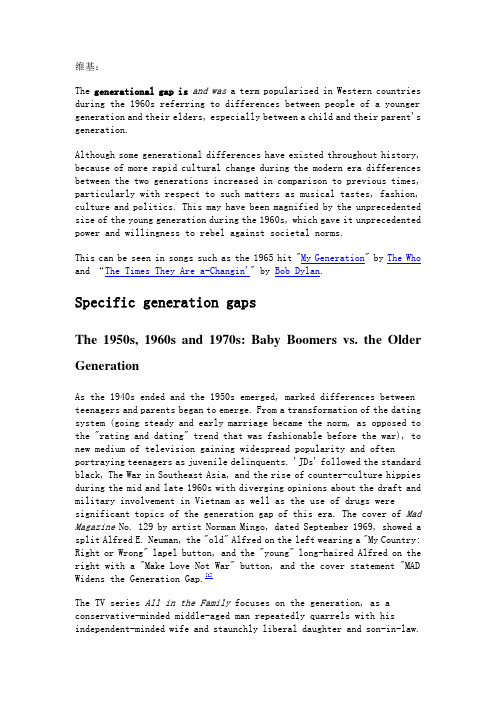
维基:The generational gap is and was a term popularized in Western countries during the 1960s referring to differences between people of a younger generation and their elders, especially between a child and their parent's generation.Although some generational differences have existed throughout history, because of more rapid cultural change during the modern era differences between the two generations increased in comparison to previous times, particularly with respect to such matters as musical tastes, fashion, culture and politics. This may have been magnified by the unprecedented size of the young generation during the 1960s, which gave it unprecedented power and willingness to rebel against societal norms.This can be seen in songs such as the 1965 hit "My Generation" by The Who and “The Times They Are a-Changin'" by Bob Dylan.Specific generation gapsThe 1950s, 1960s and 1970s: Baby Boomers vs. the Older GenerationAs the 1940s ended and the 1950s emerged, marked differences between teenagers and parents began to emerge. From a transformation of the dating system (going steady and early marriage became the norm, as opposed to the "rating and dating" trend that was fashionable before the war), to new medium of television gaining widespread popularity and often portraying teenagers as juvenile delinquents. 'JDs' followed the standard black, The War in Southeast Asia, and the rise of counter-culture hippies during the mid and late 1960s with diverging opinions about the draft and military involvement in Vietnam as well as the use of drugs were significant topics of the generation gap of this era. The cover of Mad Magazine No. 129 by artist Norman Mingo, dated September 1969, showed a split Alfred E. Neuman, the "old" Alfred on the left wearing a "My Country: Right or Wrong" lapel button, and the "young" long-haired Alfred on the right with a "Make Love Not War" button, and the cover statement "MAD Widens the Generation Gap.[1]The TV series All in the Family focuses on the generation, as a conservative-minded middle-aged man repeatedly quarrels with his independent-minded wife and staunchly liberal daughter and son-in-law.Generation X: The 1980sThe 1970s and 1980s are characterized as being an era rampant with child neglect, as shown by such phenomenon as latchkey kids. This period lies between the family-oriented 1950s and 1960s and the "Baby on Board" parenting–focused era of the late 1980s to the present.The 1990s and 2000s: Boomers vs. Generation X and YIn the 1990s and 2000s, cultural differences concerning what should be the sexual norm, as well as new technology, political differences, workplace behavior, age of consent, age of responsibility, the education system, and many other political, cultural, and generational issues, has produced a generation gap between Generation X and Y and their Baby Boomer parents. However, many Baby Boomers grew up during the late 1960s, and can relate to their young offspring better than their parents related to them and are more willing to tackle subjects such as drugs and sex with their children. Nevertheless, the portrayal of teenagers in popular reality television channels, like MTV, has caused concern for parents and a sense of alienation amongst teens and young adults of today.如何解决代沟The Generation Gap“One of Columbus‟ sailors would have been a valuable able seaman aboard Farragut‟s ships. Even a sailor from the ship that took Saint Paul to Malta would have been quite reasonably at home as a forecastle hand on one of Joseph Conrad‟s barks. A Roman cattleman from the Dacian frontier would have made quite a competent vaquero to drive longhorn steers from the plains of Texas to the terminus of the railroad, although he would have been struck with astonishment with what he found when he got there. A Babylonian administrator of a temple estate would have needed no training either in bookkeeping or in the handling of slaves to run an early Southern plantation.”--Norbert Wiener, The human use of human beings: Cybernetics and SocietyA few nights ago I attended an in-person meeting of a comic-book trade organization, Friends of Lulu. The hottest topic of debate was, “how should we hold meetings in the future?” Friends of Lulu could not have been created without the Internet. We‟ve managed to find only a few hundred members, scattered throughout the United States and Canada. Almost all of our real meetings are held on-line. This meeting could only be held in person becauseit‟s in conjunction with the largest comic book convention and trade show in the United States. Even then, only a small fraction of our membership showed up.The problem is that some of our members are left out of the on-line discussions, and they do n‟t like it and they don‟t understand it. The on-line members would end up being left out of “traditional” meetings. Our one conference call cost us hundreds of dollars and that was just for the officers. An organization as small as Friends of Lulu can‟t r eadily afford that on a regular basis.The breakdown was clearly on age lines. The older members suggested conference calls and postal mail. Some of the less reactionary suggested FAX, which would incur heavy long distance charges, but even that didn‟t g o over well. These members couldn‟t understand that Friends of Lulu only exists because the Internet allows disparate individuals to come together, and that these members will not want to give up the immediacy of the Internet for postal mail or midnight FAX.The on-line, younger members, for their part, couldn‟t understand their elders‟ opposition to being on-line. Some thought it was a monetary problem, and volunteered to donate cheap computers--after all, you don‟t need much computer power to be on the Internet. Others thought it was just a matter of training, and volunteered to provide free Internet training. Both of these were considered insulting by their elders.Neither side understood that the problem was a fundamental difference in culture. One c ulture can‟t see any advantage to on-line communication vs. face to face communication, and the other culture can‟t see how an organization as far-flung as ours can survive without the importantdecision-making happening on-line.This is not your father‟s generation gap.Scientific American published a “Parable of the Pizza Parlor” (?) in which a pizza parlor goes on-line and jettisons the restaurant aspect completely. The MIT dean who wrote the parable finished with:The customers also liked the new setup; they could always get exactly what they wanted, quickly, reliably and inexpensively. But they sometimes missed the atmosphere of the ramshackle old parlors, the conversations that unfolded there and the opportunities that the pizzerias afforded to get out of the house and feel like part of a local community.The customers will miss no such thing, because (1) they won‟t know it existed, (2) they‟ll get into their own conversations with who they want to talk to, (3) they will use the term “get out of the house” to include getting onto theworld-wide discussion, and (4) they will already have their own definition of local community that will not include the dean at MIT. The only people who will miss it are the dead and a few aging MIT deans. Cliff Stoll, Silicon Snake Oil, warns that giving in to the hype will create on-line addicts, lonely for real community. I think that the most lonely will be those who stay behind.The …generation gap‟ has existed for all of our lifetimes, but it is not an inescapable fact of human life. It is common to claim that the generation gap has always been with us, from cavemen on down. There may certainly have been some form of friction between young and old before the twentieth century, but it was as much the friction between wise and foolish or weak and strong as anything else, and even this was acknowledged as the natural order of things.Our generation gap is far more than the wildness of youth. Our generation gap is a generational war, a war between cultures, in the same way that Muslims and Christians war. It is the friction between people who do not understand each other, the same friction and frustration felt by businessmen and tourists traveling to completely different cultures.And this is no symbolic war. It is the real McCoy, complete with soldiers, guns, and concentration camps. Ever since the sixties, being “young” has been part of the profile that police use in determining whether or not to stop someone for the purpose of putting them in jail. We have laws designed specifically to target the college-age and just beyond.These are the drug laws. The drug teetotaler and the drug abuser are both more unhealthy, psychologically, than the drug experimenter; this has been shown time and again, and the vast majority of drug users are experimenters, not abusers. But ever since the sixties, when our generational war spilled onto the streets, we have used “the drug scourge” as a reason for jailing the young. These laws, originally designed to keep minorities under control, were strengthened by the old specifically to target the new breed of unruly youngsters.In 1969, one survey found that “42 percent of American parents would report their own children to the police if discovered using prohibited drugs.” (?) Would you be willing to point a gun at your children and force them into the county jail next to the man who murdered your neighbor?In today‟s world, we‟ve decided that jailing our children for using drugs is more important than jailing the man who murdered your children. The sentences are longer, and when there‟s no room to hold both the murderer and the drug user, we set the murderer free.In the many small depressions of the eighteen hundreds, we took a look at the drugs of the Chinaman and made opium illeg al, so as to “vex and annoy the Heathen Chinese”, (?) who were then taking jobs from real Americans. When free Blacks flocked to the northern cities, we decided that the “cocaine fiend” was almost always a Negro, and the Harrison Narcotics Act cracked down on “their” drug. During the great depression, it was the Mexicans we looked to for scapegoats, and we discovered a relatively boring drug called marihuana. Marihuana soon became the source of the “moral irregularities of Mexicans”. (?) And we made marihuana illegal so as to be better able to arrest Mexicans, as we had done for Blacks and Chinese before.In the seventies we acted no differently: we took a look at the drugs in use by the young, and rather than control them in the fashion of alcohol, we uncontrolled them in the most violent way possible. We sent their trade off into the black market. We then declared war on the buyers and sellers and filled our prisons with those we captured. Already a third of state felony convictions are for drug charges. Fifty percent of all felony prisoners are between the ages of 20 and 29. A full ten percent of felony prisoners are teenagers: 13 to 19 years.What do we do with these prisoners of war? We sentence them to more prison time than murderers and rapists, and in some cases we even force them through a “boot camp” to indoctrinate them in the ways of the old.What does this mean for the net? You can bet that hacking will follow drug use as a crime, not because it kills or maims, but because it is a crime of the young. How many eighty year-old hackers have been paraded onto TV?The world of today is not the world of yesterday, and yesterday‟s world was not last week‟s. This was not always the case. From the ancient Roman empire to the American War Between the States, the world was the same as it had been for the last generation. Farmers in the seventeenth century would have had no problem …falling back‟ to the dawn of agriculture. Scholars from Babylon could, as well, have understood the philosophies of the age of reason. Today‟s farmers and scholars have no such luxury. We have neither the option to turn back the clock nor, like Buck Rogers, to turn it forward. The science education of forty years ago is nearly worthless today. The mechanic of forty years agow ould not be able to fix today‟s cars, nor would today‟s mechanic, forced into the 2030s, understand the cars of the future.Should any of us crawl into a cave of strange gasses and awaken a century later, we will not be the heroes of our own movie serials or television series. We will be helpless and confused, and completely unable to cope without extensive help from the people of that time. Neither Colonel Deering nor Dale Arden will fall in love with us.In the twenties, youngsters learned of cars and mechanics, where their parents had traveled by horseback or been forced along the water routes--or hadn‟t traveled at all. Trips across the vast United States become possible nearly on a whim, though this didn‟t become popular until another generation had passed and the idea could seem …normal‟. Normal to a new generation that grew up with cars.In the fifties, we received television, and teenagers and young men …played‟ with the electronic innards of these new Cyclops, but it wasn‟t until a generation later that these one-eyed monsters stole children from their parents. We know nothing about computer networks, in the same way that the geeks and techies of 1910 knew nothing about cars. Some of us do know that computer networks will revolutionize the world, but none of us know how. Our children, however, will take to the computer nets in the same way that thepost-World War II generation took to the automobile. We haven‟t yet figured out who the first James Dean of the 21st century is going to be, but she will be a hacker, and she will die young.In the late seventies and early eighties, the children of the electronic age turned to computers. I bought my first computer in the summer of 1980 or 1981. To the elders of the town it was as strange as the atomic bomb. My picture accompanied a quarter-page article in the Muskegon Chronicle, a newspaper serving a city of 40,000 and a surrounding area of at least 20,000 more. It was news solely because I owned a computer, and could actually make it do things. Today‟s children don‟t care about computers. Where I worked, they play on the infobahn. I‟m struggling to keep up, but I‟m always a day late and a dollar short.I‟ve a recurring nightmare in which, minutes after dropping this manuscript in the mail to the publ isher, I‟m surprised by a bookstore display for some kid‟s Why Don‟t We Do It In the Road: Generation Y on the Infobahn. The only thing that‟ll save me is that publishers are all old fogeys too, and they don‟t understand why such a book would become the bible of the next generation.If you went to college in the fifties, what you learned is no longer taught. What I learned in college is taught to high school students. In another generation it will be part of kindergarten fare, if we even have kindergarten or anything resembling the modern school system in another generation. Today‟s children are more knowledgeable than their parents. The kid fresh out of med school is more up-to-date on medical practices than the experienced doctor. Experience and the wisd om of age no longer go hand in hand with knowledge. We‟ve separated wisdom and knowledge right down to the games our children play, (!) so that it is not out of the question that a man may be wise but not knowledgeable.In Understanding Media, Marshall McLuhan quotes an IBM executive as saying “My children had lived several lifetimes compared to their grandparents when they began grade one.” (?)The wise fool is no longer an oxymoron; the term simply applies to the older and middle-aged rather than the college sophomore. The accumulation of knowledge in all fields has accelerated to such a speed that some theorists believe that trade in knowledge, like trade in weapons or wheat, will become, or has already become, the “next major source” of power. Be tha t as it may, our store of knowledge is growing at a phenomenal rate, and there are no signs that it will let up. More likely, it will accelerate even faster, widening each year‟s generation gap into a more and more unbreachable chasm before we settle down into the information age.It may not be that long after we‟re settled into our information age rut that we enter the next age, currently predicted to be the nanotech age. Nanotechnology promises to give us full control over matter and biology, bringing us to the heart of the cell and the molecule. Nanotech is a subject for another book entirely, but the very fact that we can predict the nanotech age is proof that something even more inexplicable will soon replace even that.What will your children be do ing in the future on the infobahn? If you‟re lucky, they‟ll be supporting you, because you won‟t have the knowledge to support yourself. During an interview on Marketplace on Public Radio International, a guest noted that Microsoft Corporation, the premier software company, has an incredibly high turnover rate. Employees in their twenties expect to work there for three to five years before leaving, and employees in their thirties are already talking about retirement. “You cannot turn over employees by thet housands and expect to retain that edge,” said the guest. (?) But Microsofthas been “turning over employees by the thousands” for years, and they have, at least for the moment, retained “that edge”.Most likely their edge is the result of their high turnover. They throw out the old and obsolete and bring in the new and cutting edge, just like the rest of us do with computer hardware and software. How much programming has Bill Gates done lately? He hires young people to do it for him.In Rome, the elite and the common people grew apart so much that they spoke different dialects; the common folk spoke “vulgar” (that is, common) Latin. In England after the French conquerors left, French remained the language of government. Governments are institutions devoted to remaining in power, and that usually translates to remaining the same. If you read histories of American politics, you will see, for example, the same names in politics in the twenties that you see today. The children of politicians become politicians.The “generation gap” goes beyond mere human age: any industry or institution that lives in the past will find itself in conflict with the real world, or at least increasingly apart from it.Governments, whose power is generally devoted simply to staying in power, foster a lack of change. Organizations created …temporarily‟, such as the Bureau of Alcohol, Tobacco, and Firearms, created for enforcingpost-prohibition alcohol, tobacco, and firearms bans, or the various electrical …cooperatives‟ of the thirties, live far beyond their useful lifespan. Their leaders claim tooth and nail that the need lives on. And the need does live on: the need is for jobs for voters and power for the leaders themselves. When opponents claim that such projects are no longer necessary, the cry goes up that eliminating the project will eliminate jobs. A large number--indeed, possibly the majority--of government jobs are simply well-paying forms of welfare, producing unneeded service in exchange for a dole.As change in our society accelerates, government bloat will also accelerate, as we start more and more …temporary‟ projects. Government will become a very expensive archaeological dig, with each year‟s projects providing a layer for historians to dig into and for humorists to laugh at. But government bloat is also likely to increase the dangers of the generation war. The more money being spent on obsolescent, long lost needs, the less money exists for the needs of the day.That money will need to be taken from the young at federal gunpoint. And the conflict between government and governed becomes as dangerous as the conflict between old and young.The Internet, or whatever replaces it, will be the major weapon in that conflict. It is the neutron bomb of the information wars: the generation gap as well as voter rebellion. Never trust anyone over thirty? I haven‟t trusted myself for years.代沟如今,父母和子女之间经常缺乏沟通.子女经常抱怨父母过时了;而父母并不赞同子女的言行.于是一个很大的代沟就产生了. 产生代沟的原因有很多.子女希望过比父母允许的更独立的生活:自由的选择自己的朋友;在学校里自由的选择自己的社团;自由的描绘自己的将来;自由的支配自己的花费.当然年轻的子女们也希望能够得到父母的理解.但是并不是大多数的父母都能够理解他们的孩子,他们认为教育他们的后代树立传统的信仰是他们应有的责任,他们希望子女在家里能够孝顺,在学校能够好好学习.于是,不理解就往往从父母打算干涉子女的日常生活中产生了.我认为:父母和子女间的代沟问题可以通过双方相互理解来共同解决.Generation GapNowadays, there is often a lack of understanding between parents and children. Children always complain that their parents are out of date, while parents can‟t approve of what their children say an d do. Thus, a big generation gap is formed.The gap remains wide for many reasons. Children want to be free to choose their own friends, select their own classes in school, plan their own future, earn and spend their own money, and generally run their own life in a more independent way than many parents allow. Also, young children wish to be understood by their parents, but most parents don‟t quite understand their children. They regard it as their responsibility to teach their offspring traditional beliefs. They want them to be obedient and do well in school. Therefore, misunderstanding often arise from parents‟ tendency to interfere in children‟s daily activities.In my opinion, most problems between parents and children could be solved by joint efforts of both sides to enhance mutual understanding.The Generation Gap「代沟」(1)Today's teenager is a young adult; he is more mature andresponsible than the teenagers of previous generations. Nevertheless, he is beset with customary trials natural to his age group-disconcerting periods of self-doubt and other periods of self-sufficiency. His character and personality are in the process of being molded. It is a stage when he is not quite sure he wants to be on his own, yet he resents too much parental pressure. This attitude and feeling is called the generation gap or the communication gap. However, this attitude and feeling will change as he learns how to live with the world, especially with his parents, brothers, sisters, and teachers.(2)(叙述者是位父亲,他以过来人的经验来说明代沟)I remember that when I was in my teens, I used to refuse to obey many of the "do's" and "don'ts" my parents dictated to me. For example, when I kept on playing jazz records on the stereo, my father would condemn such music as sheer noise and replaced them with disks of classical music that I always considered extremely dull. When I insisted that I sleep with my pet dog, they immediately said, "No way," because they thought I would be bitten by fleas. These were just a few examples of the things I thought my parents were unreasonable about.Today, however, I am a father of a boy aged 15, and I find that I too, am pressuring my son with a lot of rules andregulations hard for him to "swallow". It's not uncommon to hear my yelling at him, "What do you mean by fooling around all night without reviewing your lessons?" or "How come you did it? You are still wet behind the ears." The other day, I noticed that my son wore giant pants that three teen-agers could occupy. No one would wear them on the grounds that they were indecent and undignified. I at once commanded him to take them off. Usually, he is fairly obedient, but this time he put his foot down. "What's wrong with giant pants? All my classmates wear them, and I don't think you have the authority to order me to remove them, even though you are my father!" said he. When I was a boy, if I had spoken with such rudeness to my elders, I would have been given a good beating. But I suddenly realized that we are now living in a more liberal society, and that my son's insistence on wearing giant pants was merely an instance of the generation gap that existed between us. Therefore, I gave in and now he still wears giant pants.was merely an instance of the generation gap that existed between us. Therefore, I gave in and now he still wears giant pants.。
Generation Gap(代沟)
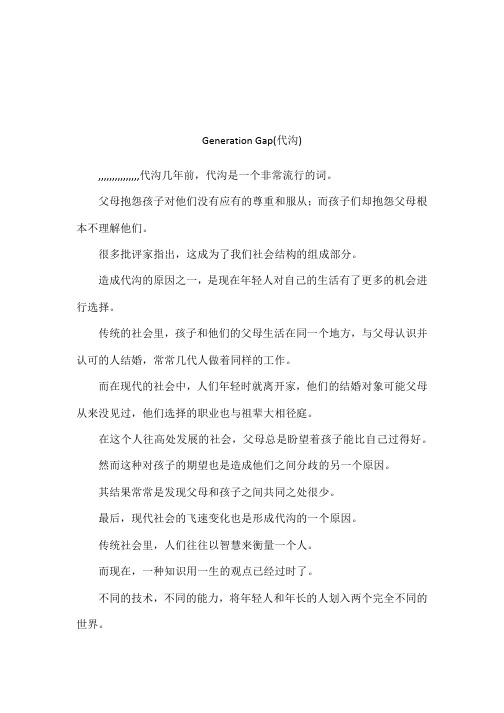
Generation Gap(代沟) ,,,,,,,,,,,,,,,代沟几年前,代沟是一个非常流行的词。
父母抱怨孩子对他们没有应有的尊重和服从;而孩子们却抱怨父母根 本不理解他们。
很多批评家指出,这成为了我们社会结构的组成部分。
造成代沟的原因之一,是现在年轻人对自己的生活有了更多的机会进 行选择。
传统的社会里,孩子和他们的父母生活在同一个地方,与父母认识并 认可的人结婚,常常几代人做着同样的工作。
而在现代的社会中,人们年轻时就离开家,他们的结婚对象可能父母 从来没见过,他们选择的职业也与祖辈大相径庭。
在这个人往高处发展的社会,父母总是盼望着孩子能比自己过得好。
然而这种对孩子的期望也是造成他们之间分歧的另一个原因。
其结果常常是发现父母和孩子之间共同之处很少。
最后,现代社会的飞速变化也是形成代沟的一个原因。
传统社会里,人们往往以智慧来衡量一个人。
而现在,一种知识用一生的观点已经过时了。
不同的技术,不同的能力,将年轻人和年长的人划入两个完全不同的 世界。
毫无疑问,在今后相当一段时间里,代沟将会继续成为我们生活的一 个特征。
它产生的原因源于社会的自由和选择,源于社会日新月异的快速发展。
。
大学英语口语教程 The generation gap 代沟
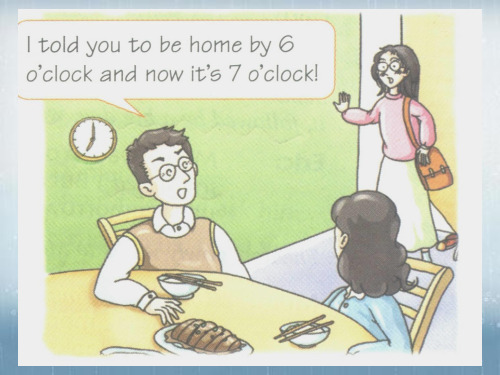
Useful expressions
• • • • • • • • • • • • • • Owing to: 因为 On/to the contrary: 正相反 For one’s sake: 为了…的缘故,为了…的利益 Let go of: 放手;放开 In charge of: 负责 Talk sth. over 商议,讨论 Get rid of : 摆脱;丢弃 Lose one’s cool: 失去冷静 Apply to do sth. (for sth.): 申请 Encounter Optimistically tend to Accounts of out of touch
How to narrow the generation gap
1. Communicate with each other, try to understand each other 2. Have patience
3. Put one feet into other’s shoes
4. The key to bridge the gap is understanding, is the holy love between family members.
Байду номын сангаас
• Generation gap Generation gap refers to the distance and contradiction(矛盾) between the old and the youth. • It’s a common(常见的) phenomenon(现象) that exits everywhere in the world and influences both the old and the youth. Generally speaking, generation gap results in different understanding and appreciation of the great and constant(固定的) changes of the world, different reaction to new things, and different attitudes to tradition(传统) principles(原则) and beliefs. Therefore, we may say where there are the old and the youth; there is the generation gap. • Generation gap is natural, but very influential(有影响 的). If we cannot deal with it appropriately(适当地), the gap will be greater and the greater and consequently(结 果) affect the work and the relation between the old and the young.
generationgap的中文翻译
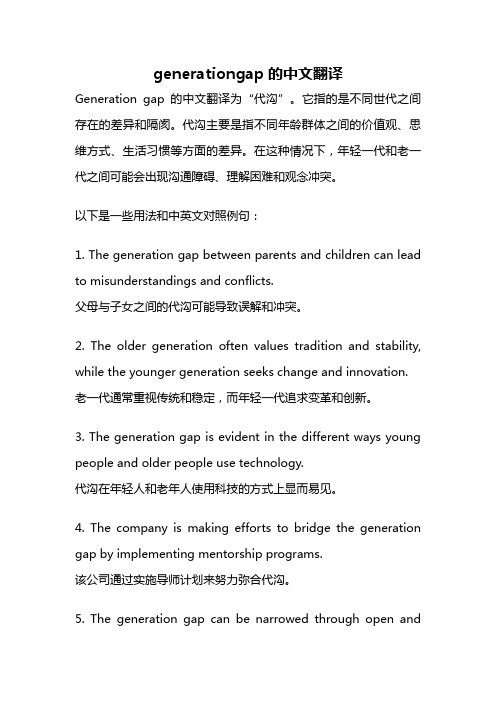
generationgap的中文翻译Generation gap的中文翻译为“代沟”。
它指的是不同世代之间存在的差异和隔阂。
代沟主要是指不同年龄群体之间的价值观、思维方式、生活习惯等方面的差异。
在这种情况下,年轻一代和老一代之间可能会出现沟通障碍、理解困难和观念冲突。
以下是一些用法和中英文对照例句:1. The generation gap between parents and children can lead to misunderstandings and conflicts.父母与子女之间的代沟可能导致误解和冲突。
2. The older generation often values tradition and stability, while the younger generation seeks change and innovation.老一代通常重视传统和稳定,而年轻一代追求变革和创新。
3. The generation gap is evident in the different ways young people and older people use technology.代沟在年轻人和老年人使用科技的方式上显而易见。
4. The company is making efforts to bridge the generation gap by implementing mentorship programs.该公司通过实施导师计划来努力弥合代沟。
5. The generation gap can be narrowed through open andrespectful communication.通过开放和尊重的沟通,可以减少代沟。
6. It is important for both older and younger generations to try to understand each other's perspectives and bridge the generation gap.对于老年人和年轻人来说,努力理解对方的观点并弥合代沟是很重要的。
on_generation_gap带翻译
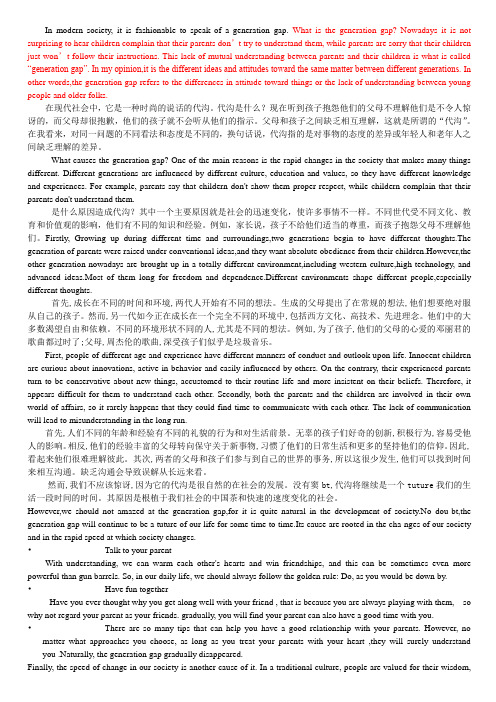
In modern society, it is fashionable to speak of a generation gap. What is the generation gap? Nowadays it is not surprising to hear children complain that their parents don’t try to understand them, while parents are sorry that their children just won’t follow their instructions. This lack of mutual understanding between parents and their children is what is called “generation gap”. In my opinion,it is the different ideas and attitudes toward the same matter between different generations. In other words,the generation gap refers to the differences in attitude toward things or the lack of understanding between young people and older folks.在现代社会中,它是一种时尚的说话的代沟。
代沟是什么?现在听到孩子抱怨他们的父母不理解他们是不令人惊讶的,而父母却很抱歉,他们的孩子就不会听从他们的指示。
父母和孩子之间缺乏相互理解,这就是所谓的“代沟”。
在我看来,对同一问题的不同看法和态度是不同的,换句话说,代沟指的是对事物的态度的差异或年轻人和老年人之间缺乏理解的差异。
What causes the generation gap? One of the main reasons is the rapid changes in the society that makes many things different. Different generations are influenced by different culture, education and values, so they have different knowledge and experiences. For example, parents say that childern don't show them proper respect, while childern complain that their parents don't understand them.是什么原因造成代沟?其中一个主要原因就是社会的迅速变化,使许多事情不一样。
Unit 3 generation gap

n. 代沟(两代人之间的隔阂)interval between generations
Unbridgeable Generation Gap 不可逾越代 沟
gaps
gaps
gaps
generation gap
Deepening generation gap 加深的代沟 Eliminate generation gap 消除代沟 Narrow generation gap
Drama 戏剧
Drama is often combined
with music and dance: the drama in opera is generally sung throughout;
舞台剧,可以定义为呈现于舞台的戏剧艺
术。舞台剧按内容可以分为喜剧、悲剧和 正剧;按表现形式可以分为歌剧、舞剧、话 剧、哑剧、诗剧、偶发剧、木偶剧等
three genres of drama
Western drama originates in classical
Greece. The theatrical culture of the citystate of Athensproduced three genres of drama: tragedy, comedy, and the satyr play.
Western opera歌剧
Western opera is a dramatic art form,
which arose during the Renaissance in an attempt to revive the classical Greek drama tradition in which both music and theatre were combined. Being strongly intertwined with western classical music, the opera has undergone enormous changes in the past four centuries and it is an important form of theatre until this day.
Generation gap (代沟)

•In 1960s,American anthropologistMargaret Mead first put forward thisword.(上世纪60年代,美国人类学家玛格丽特.米德首先提出了“代沟”这个概念。
)•The two generation have different values ,the ways of thinking ,behavior and ethical standards .Those result in difference of ideas and Behaviorhabits between them.(代沟是指两代人因价值观念、思维方式、行为方式、道德标准等方面的不同而带来的思想观念、行为习惯的差异。
)In modern times,science and technology hav brought many convenient to us.Many older people don't use that our new generation have the honor to use.(在当今时代,科技给我们带来了许多便利,许多老一辈的人没用过的东西我们新一代却有幸用用上了。
)Two generation of growth is different,have different experiences,the outlook on life,world, values are also different.(两代人有不同的成长经历,产生的人生观,价值观,世界观也就不同了。
)A simple example is:when an elderly ormiddle-aged people say someone is "honest", that is praise him;but when a 80s or 90s saythat ,you probably not happy,because it represents stiff,rigid.(举一个简单的例子:当一个老年人或中年人说某人“老实时”,那是在夸奖他;而当一个80后或90后这样说是,你可能就不高兴了,因为那或许意味着死板,木讷。
英语四级范文:GenerationGap

英语四级范文:GenerationGapDirections: Write a composition entitled Generation Gap. You should write at least 120 words according to the outline given below in Chinese:1. 现代生活越来越好,但老年人和年轻人之间的代沟却依然不可逾越2. 产生代沟的原因3. 解决的办法【范文】Generation GapThough many aspects of our social life have been improved, the generation gap between the youths and the olders remain and even grows wider.In my opinion, because of the influence of individualism from western civilization, the youths do not blindly follow what the elders say, that causes the gap. The young are creative and revolutionary, always go along with the trend and like changing. While the old, accustomed to everything of the past, are hostile to change. Also with more and more different beliefs and philosophical ideas, it is natural the young hold different opinions from the old.I think in order to narrow the gap, both parts should try to understand and respect each other, instead of trying to change others as they wish. Diversity doesn't mean conflict so long as they hold the right attitude towards the problems.。
GenerationGap(代沟)_英语四级作文
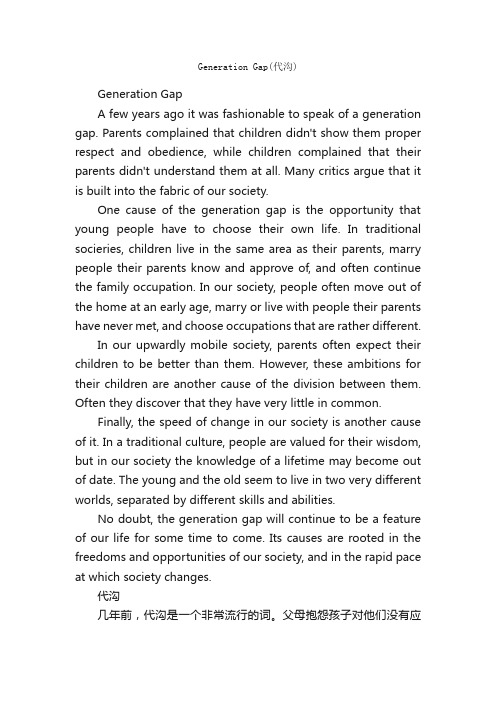
Generation Gap(代沟)Generation GapA few years ago it was fashionable to speak of a generation gap. Parents complained that children didn't show them proper respect and obedience, while children complained that their parents didn't understand them at all. Many critics argue that it is built into the fabric of our society.One cause of the generation gap is the opportunity that young people have to choose their own life. In traditional socieries, children live in the same area as their parents, marry people their parents know and approve of, and often continue the family occupation. In our society, people often move out of the home at an early age, marry or live with people their parents have never met, and choose occupations that are rather different.In our upwardly mobile society, parents often expect their children to be better than them. However, these ambitions for their children are another cause of the division between them. Often they discover that they have very little in common.Finally, the speed of change in our society is another cause of it. In a traditional culture, people are valued for their wisdom, but in our society the knowledge of a lifetime may become out of date. The young and the old seem to live in two very different worlds, separated by different skills and abilities.No doubt, the generation gap will continue to be a feature of our life for some time to come. Its causes are rooted in the freedoms and opportunities of our society, and in the rapid pace at which society changes.代沟几年前,代沟是一个非常流行的词。
Generation Gap(代沟)
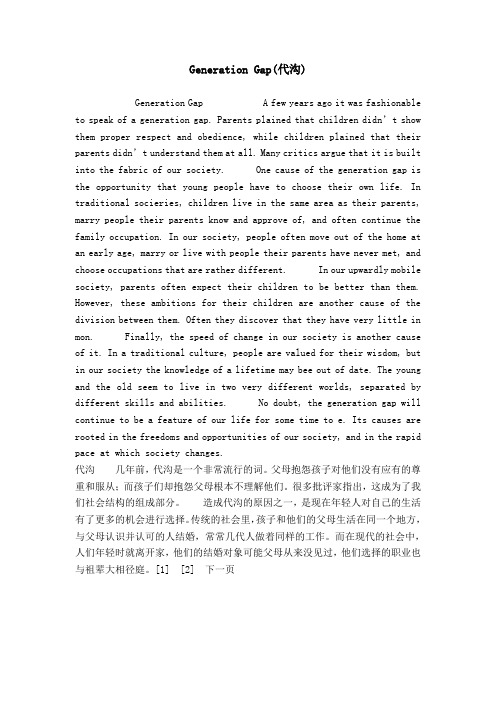
Generation Gap(代沟)Generation Gap A few years ago it was fashionable to speak of a generation gap. Parents plained that children didn’t show them proper respect and obedience, while children plained that their parents didn’t understand them at all. Many critics argue that it is built into the fabric of our society. One cause of the generation gap is the opportunity that young people have to choose their own life. In traditional socieries, children live in the same area as their parents, marry people their parents know and approve of, and often continue the family occupation. In our society, people often move out of the home at an early age, marry or live with people their parents have never met, and choose occupations that are rather different. In our upwardly mobile society, parents often expect their children to be better than them. However, these ambitions for their children are another cause of the division between them. Often they discover that they have very little in mon. Finally, the speed of change in our society is another cause of it. In a traditional culture, people are valued for their wisdom, but in our society the knowledge of a lifetime may bee out of date. The young and the old seem to live in two very different worlds, separated by different skills and abilities. No doubt, the generation gap will continue to be a feature of our life for some time to e. Its causes are rooted in the freedoms and opportunities of our society, and in the rapid pace at which society changes.代沟几年前,代沟是一个非常流行的词。
高中英语作文范文:Generationgap代沟_高中英语作文_
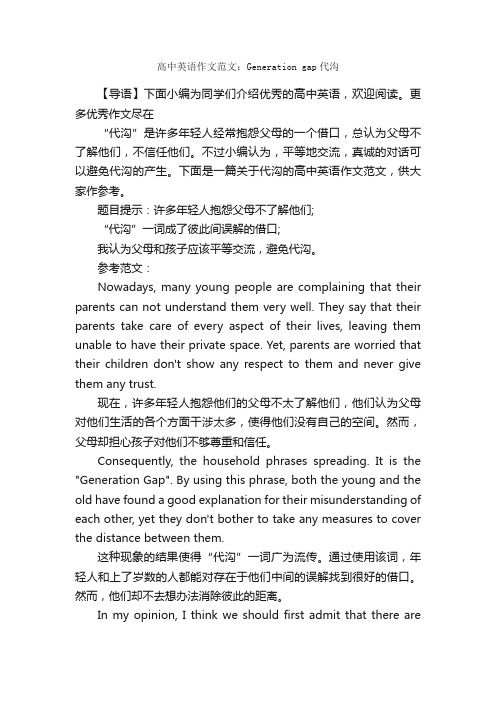
高中英语作文范文:Generation gap代沟【导语】下面小编为同学们介绍优秀的高中英语,欢迎阅读。
更多优秀作文尽在“代沟”是许多年轻人经常抱怨父母的一个借口,总认为父母不了解他们,不信任他们。
不过小编认为,平等地交流,真诚的对话可以避免代沟的产生。
下面是一篇关于代沟的高中英语作文范文,供大家作参考。
题目提示:许多年轻人抱怨父母不了解他们;“代沟”一词成了彼此间误解的借口;我认为父母和孩子应该平等交流,避免代沟。
参考范文:Nowadays, many young people are complaining that their parents can not understand them very well. They say that their parents take care of every aspect of their lives, leaving them unable to have their private space. Yet, parents are worried that their children don't show any respect to them and never give them any trust.现在,许多年轻人抱怨他们的父母不太了解他们,他们认为父母对他们生活的各个方面干涉太多,使得他们没有自己的空间。
然而,父母却担心孩子对他们不够尊重和信任。
Consequently, the household phrases spreading. It is the "Generation Gap". By using this phrase, both the young and the old have found a good explanation for their misunderstanding of each other, yet they don't bother to take any measures to cover the distance between them.这种现象的结果使得“代沟”一词广为流传。
Generation_gap_中英对照
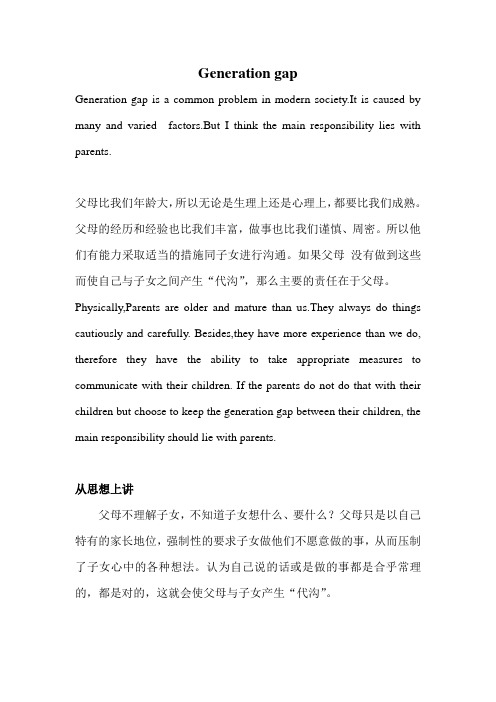
Generation gapGeneration gap is a common problem in modern society.It is caused by many and varied factors.But I think the main responsibility lies with parents.父母比我们年龄大,所以无论是生理上还是心理上,都要比我们成熟。
父母的经历和经验也比我们丰富,做事也比我们谨慎、周密。
所以他们有能力采取适当的措施同子女进行沟通。
如果父母没有做到这些而使自己与子女之间产生“代沟”,那么主要的责任在于父母。
Physically,Parents are older and mature than us.They always do things cautiously and carefully. Besides,they have more experience than we do, therefore they have the ability to take appropriate measures to communicate with their children. If the parents do not do that with their children but choose to keep the generation gap between their children, the main responsibility should lie with parents.从思想上讲父母不理解子女,不知道子女想什么、要什么?父母只是以自己特有的家长地位,强制性的要求子女做他们不愿意做的事,从而压制了子女心中的各种想法。
认为自己说的话或是做的事都是合乎常理的,都是对的,这就会使父母与子女产生“代沟”。
From the perspective of option, parents do not understand their children and they do not know what their children are thingking .They are in their own unique position and compel their chilren to do what they don't like to. Since parents stamp on a child's idea ,the generation gap between parents and chilren arises.从现代教育上讲子女所要接受的教育很多,而家庭教育则是子女接受教育中最为重要的教育内容之一。
GenerationGap(代沟)

GenerationGap(代沟)generation gapa few years ago it was fashionable to speak of a generation gap. parents complained that children didn't show them proper respect and obedience, while children complained that their parents didn't understand them at all. many critics argue that it is built into the fabric of our society.one cause of the generation gap is the opportunity that young people have to choose their own life. in traditional socieries, children live in the same area as their parents, marry people their parents know and approve of, and often continue the family occupation. in our society, people often move out of the home at an early age, marry or live with people their parents have never met, and choose occupations that are rather different.in our upwardly mobile society, parents often expect their children to be better than them. however, these ambitions for their children are another cause of the division between them. often they discover that they have very little in common.finally, the speed of change in our society is another cause of it. in a traditional culture, people are valued for their wisdom, but in our society the knowledge of a lifetime may become out of date. the young and the old seem to live in two very different worlds, separated by different skills and abilities.no doubt, the generation gap will continue to be a feature of our life for some time to come. its causes are rooted in the freedoms and opportunities of our society, and in the rapid pace at which society changes.代沟几年前,代沟是一个非常流行的词。
关于代沟 Generation Gap
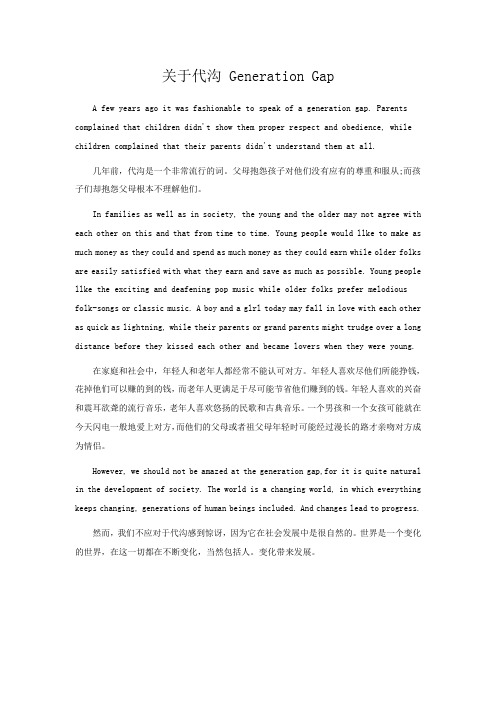
关于代沟 Generation GapA few years ago it was fashionable to speak of a generation gap. Parents complained that children didn't show them proper respect and obedience, while children complained that their parents didn't understand them at all.几年前,代沟是一个非常流行的词。
父母抱怨孩子对他们没有应有的尊重和服从;而孩子们却抱怨父母根本不理解他们。
In families as well as in society, the young and the older may not agree with each other on this and that from time to time. Young people would llke to make as much money as they could and spend as much money as they could earn while older folks are easily satisfied with what they earn and save as much as possible. Young people llke the exciting and deafening pop music while older folks prefer melodious folk-songs or classic music. A boy and a glrl today may fall in love with each other as quick as lightning, while their parents or grand parents might trudge over a long distance before they kissed each other and became lovers when they were young.在家庭和社会中,年轻人和老年人都经常不能认可对方。
- 1、下载文档前请自行甄别文档内容的完整性,平台不提供额外的编辑、内容补充、找答案等附加服务。
- 2、"仅部分预览"的文档,不可在线预览部分如存在完整性等问题,可反馈申请退款(可完整预览的文档不适用该条件!)。
- 3、如文档侵犯您的权益,请联系客服反馈,我们会尽快为您处理(人工客服工作时间:9:00-18:30)。
Generation gap
父母比我们年龄大,所以无论是生理上还是心理上,都要比我们成熟。
父母的经历和经验也比我们丰富,做事也比我们谨慎、周密。
所以他们有能力采取适当的措施同子女进行沟通。
如果父母没有做到这些而使自己与子女之间产生“代沟”,那么主要的责任在于父母。
从思想上讲
从现代教育上讲
子女所要接受的教育很多,而家庭教育则是子女接受教育中最为重要的教育内容之
一。
"在谈及家庭教育必然要谈到父母与子女的关系问题。
我们知道,一个良好的家庭环境必然会形成一个和睦而又温暖的家庭。
如果家庭中各成员之间产生隔阂,必然会对子女的成长造成一定的影响。
父母的言行和品德对子女有很大的影响。
从子女一出生,父母就成了子女的启蒙老师,从此他们就担负着培养和教育子女的责任和义务,同时也是他们承担的社会责任。
而父母的失职就可能给家庭蒙上一层阴影,造成家庭冷漠不和,以及子女的悲观、消极思想。
Intermsoffamilyeducation,parentsplayanimportantpartintherelationship between parents and children. We know that a good familyenvironmentisboundtoformaharmoniousandwarmfamily.Whatparents say and behave has a great influence on their children
Negligenceoftheparentscancausechildren'spessimisticandnegativevalues.This is also one of the factors causing the generation gap.
From the above arguments,we can draw a conclution thatthe generationgap is largely due to parents.
1/ 1。
